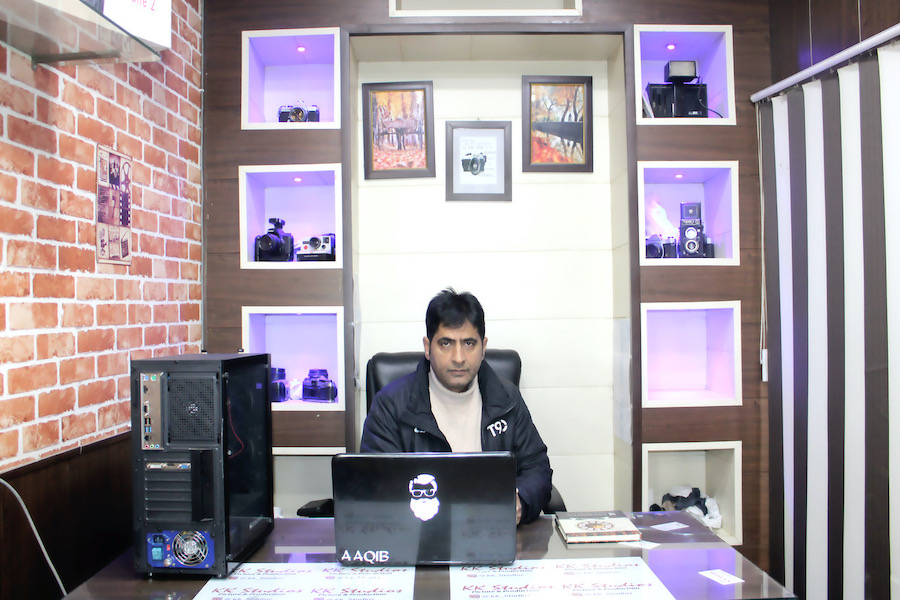In erstwhile Kashmir, almost every town had a shop of the photographer. While helping people record their weddings, clicking their Hajj and examination photographs, they would sometimes record the history of the place. Daanish Bin Nabi meets one of Sopore’s oldest studio owners.

If Srinagar has Mehatas, Kashmir’s apple-town Sopore has K K Studio. Located in the heart of the town, it has recorded diverse shades of the north Kashmir town that lives since 888 AD.
The Studio, however, is quite a junior to Mehatas’. Started by Kerman dynasty’s scion, Peerzada Muhammad Ashraf in 1978, the Shah Faisal market Studio was initially K K Electricals and Studios. Bila Singh was the first photographer hired by the promoter. A history lecturer at Sopore Higher Secondary School, Ashraf died of a heart attack on October 27, 1989, at the age of 49.
On November 4, 1989, Khalid, his son, took over the reins of his father. Soon, he gave up electronics and focused on the Studio.
“As a ninth-standard student, I took my first professional picture in 1988,” Khalid said. “It was a portrait but I don’t remember the subject. It was a Yashika camera having 12 snaps with 120 mm rolls.”
In 1991, the Studio was destroyed in a blaze caused by a short circuit. He revived his Studio with an Asia Pentoo Camera, which he had somehow managed to save from the blaze. In 1996, he joined Soproe Degree College, married in 2000 and is the proud father of three daughters. “So far, I have clicked 1,16,800 photographs,” he calculates.
Limitations of the market, the advent of new technologies and the impact of strife prevented Khalid from growing big. Most of the time, he used to develop black and white negatives and for colour processing, he was required to send his rolls to Srinagar, a delivery that would take eight days.
However, the changes in the market have pushed the young Peerzada to be part of the change. In May 1994, Khalid said he did his first outdoor shoot on Baba Shakoor-ud-Din hills, not knowing that outdoor shooting would be the new in-thing of the digital era. Though traditional photography became almost non-remunerative, Khalid and his brother, Peerzada Mudassir Ashraf, are doing every bit to ensure their father’s dream does not die.
“My brother is extending every possible support,” Khalid said. “He runs our operations in Srinagar and manages the wedding vertical of our studio.”
The Studio has dedicated workers. Muhammad Mushtaq Banday, a household name in the town, has been a fulcrum of the Studios. He served the Studio for a long time from 1983 to 2017.
“I must have clicked lakhs of photographs,” Mushtaq said. “I do not remember all but I do vividly remember the occasions when I clicked a photograph of Ahad Bab, a revered peer of the north Kashmir.”
Those were the days when the photograph was either a mandatory requirement or an absolute luxury. It was even rare during weddings because not everybody would afford it. Then, Mushtaq remembers, people from far-flung areas like Kulangam in Kupwara used to come for photo shooting. “I have clicked almost all the politicians who visited Sopore. Almost all marriages of Sopore have I covered during these 25 years I was with the studio,” Mushtaq said. During the peak strife, Mushtaq said, it was very tough to work. “I have destroyed many cameras rolls out of fear. We used to hide the cameras from the police and the paramilitary forces. It was a difficult time but we did survive.”
They had retained their works but during searches, they were asked about the people they had clicked. “How could we remember these people who had come for clicking their photographs,” Mushtaq said. “To avoid the harassment, we destroyed these works.”
During the peak militancy, they had to negotiate the new situation with caution. Khalid said they rarely kept their equipment in the Studio.
Sopore’s Town Hall was the hub of indoor games. Barely located on the opposite side of KK Studio, Khalid, remembers frequenting the Hall for covering badminton matches during the late eighties. The situation changed after the militancy broke out and the Town Hall became a garrison. Initially BSF, the premises was taken over by the CRPF later. Khalid’s memories include a lot of terrifying instances of the era, some linked to the Town Hall as well.
The tragedy of January 6, 1993, literally decimated the photography infrastructure in the town. Amid a number of civilian killings, a large part of Spore went up in flames. Khalid regrets that he could not use his camera that day. “I did not know how people and the paramilitary forces would react if they see me carrying a camera,” he said. “I do have the realization that I missed that day.”
The worst part of that day was that all the competitors of K K Studio were destroyed. Over the years, Khalid said, a number of studios had emerged in the town – Karco Studio, Shaheen Studio and Fancy Studio. “Fancy Studios was very famous and it was the talk of the town. We were not even closer to him,” Khalid admitted. “Along with the Fancy Studio, its owner and his employee, a resident of the Sheikh Mohalla area of Sopore, was burnt alive inside their studio that day.”
The situation improved later. The relations between KK Studio and the inmates of the Town Hall improved. It was during the day; Khalid remembers they would spend time with many officers including Vikram Batra, who as Major became a war hero in Kargil. “I knew him since 1998 when he was posted in Sopore.”















